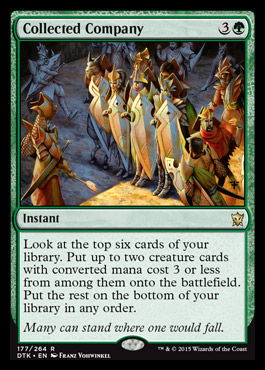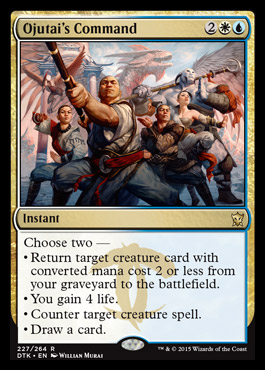Are you a Quiet Speculation member?
If not, now is a perfect time to join up! Our powerful tools, breaking-news analysis, and exclusive Discord channel will make sure you stay up to date and ahead of the curve.
There was an interesting discussion about this that spawned from this post, but there's a TL;DR version as well.
Basically, it boils down to this question: should a store employee or judge working the event also be allowed to play in the event? The rules are that they can, so there's no issue there. The question is if they should.
Full disclosure: I work part-time at a LGS and I run the midnight prereleases for us, something I also compete in. We're casual enough that we've never had any situation arise where it could be a problem, but what if the store employee happened to be the person who got a bye? Would that look bad? On the one hand I can see that, but on the other there's the reality that a lot of events are run by players, and you don't want to punish players for helping prereleases and FNMs happen.
What do you think?







If I don’t judge the FNM, there will be too much chaos. Person behind the bar can’t handle 4 FNM’s and a bar on her own on a friday evening.
But if I’m not allowed to play on my magic night, because I judge, than my friday nights will be to boring and I’ll stop judging.
I also want to add that I usually judge the midnight prerelease and I always played that one too. But since KTK, these midnight prerelease are getting too crowded for that, so I skip playing the only prerelease I can attend.
So I know when I can judge and play, and when I need to focus on judging alone.
However, this weekend, I felt a little bit bad that I couldn’t play again (I played zero prerelease this year) that I was thinking of skipping judging at the prerelease next time.
I think it’s very important to allow judges to play in casual events too, if they think they are up for it.
Of course, there could be somewhere in the world the cheating judge, but do you want to punish all judges because of that one stinky guy?
Hello,
L1 Judge here. Before becoming a judge, I often ran events for my TO (as a scorekeeper). IIRC, it is possible for non-Judge players to run casual events, but this is all under the responsability of the TO : if there is a problem during the tournament, the TO is responsible for it. Becoming a L1 Judge allowed me to be responsible for my own mistakes among other things, which I think is better for everyone involved.
Regarding on wether scorekeepers/store employees/judges should play in the events they help organize, my personal approach is based on the size of the event : under 16 people playing I often take part in the event (especially if there is an odd number of players), but over 16 people I think having the Judge play in the event is detrimental to the overall experience (Judge calls when the Judge is playing means a higher possibility of the Judge’s match going to time and slowing down the tournament for everybody).
The rest of the behavior described in the reddit post is pretty disgusting, but I don’t think such events occuring on an individual basis (I have yet to see evidence of widespread abuse of scorekeeper/Judge participation) being a reason to forbid people from entering the event. The TO in the reddit thread should definitely be reported to WotC, though.
The problem is that the rate of pay most people get for running the event (usually something along the lines of free entry) makes it worth the hassle of judging and playing, but free entry to another event probably wouldn’t be worth the effort of judging an event.
People seem to think that judges should give their time away for free, I’ve never really understood this.
A TO that plays in an event should pass down their prizing to players below them in rank.
I do not think a Judge should ever play in a event he is officially judging for. The main reason though comes down to appearance and reputation. If there are any instances that are hotly contested involving a judge in event he plays, it can cause great damage to his reputation. Even if the judge is 100% right, people could still hold grudges. Those grudges rational or not could effect the LGS and Judge in very negative ways. I do not think its worth it from that perspective.
However if a judge chooses to attend as a player and people go to him for judge calls I see no problem with that. Then if people go to him for calls they do so at their own discretion. To me you have to separate things out so there can be no question of impropriety. I do not believe this way because I distrust judges, its my experience with how irrational some players can be.
As far as store personal I think you have to be very careful when you allow staff to play. I have seen players pissed off at stores doing this. They felt it was unfair that they have to compete against a group of players with access to the stores collection.
These is just an examples, but people tend to see bias or advantage regardless of whether its really present. You have to be cognizant of not just of your perspective but those of your player base as well. I personally think everyone should get to play, however you have to do it in ways that prevent issues down the line.
I’m a TO and a judge.
I became a TO because there was no organized play here at all. Since I wanted to participate in things like FNM and prereleases, I knew I had to make it happen for myself.
Being aware that some people can find biases (even when there are none), I’ve taken every opportunity to do the following:
1) educate players as much as possible about tournaments and game rules so that there’s a smaller gap between “tournament officials” and the average player
2) have as much transparency in the process as possible so that they don’t think there are any biases (such as showing people the random results when giving out FNM promos and the like)
3) excusing myself from judge calls during matches that I’m playing in (I coached another player that wanted to go for his L1 so that we have a backup judge for these situations)
If I wasn’t able to participate in the events that I run, I would no longer have an incentive to run them — and then there simply wouldn’t be any more organized play.
I’m sure this basic scenario is replicated many other places (esp where there is geographical isolation).
I judge prerelease tournaments, FNM and the odd tournament or draft at my local games store. I don’t receive any compensation from the owner, and I play in all of the events I judge, as they are never REL competitive, let alone professional. I do it because the shop needed a judge to help the owner out, and I had substantial experience as an L2 in the late 1990s. Really, the only reason I’m an active judge again is that it helps out the store. But, if it meant that I could never play in local events again, I’d have to stop judging.
The current judge program is very well run, and all of the judges I interact with are competent, knowledgeable and frankly obsessed with fairness. As a rule, you ought to be able to trust the judges not to favor themselves. If a judge seems to be acting out of bias, you as a player need to contact the DCI and report it. The regional coordinator wants to know if any judges are acting badly, as it reflects on the entire program.
tldr: This is not the wild west of the 1990s when professional players could cheat because they were friends with the head judges. This is not a world in which a L1 or L2 will engage in favoritism.
The smaller the store, the more likely the judge will be the be able to play in the event and the less of a big deal it is. I play in a small LGS because I prefer that small LGS. The judge sometimes plays in tournies and it doesn’t matter. A bigger store with a bigger turnout, that won’t matter. I’ve played places where an event doesn’t fire if a judge isn’t the 8th participant. It’s fine there, but in bigger stores, it is less appropriate. The stores where a judge gets more calls, they will have less time to play and recognize that, so the problem really takes care of itself.
And bigger, established stores tend to have more staff on to run events that are getting paid to manage the shop, not play — as well as compensate judges as incentive to not participate as a player.
The size of the shop definitely can be a large factor here and it’s good to point out.